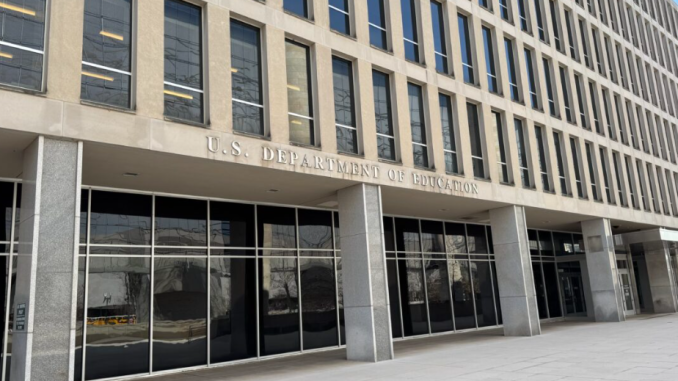
President Donald Trump promised to diminish, and eventually (with congressional approval) end the department on the campaign trail in 2024. He was elected by the American people in part to do just that — a goal of many for years.
{snip}
Numerous left-wing states, special interests, unions, and school districts — many of which had become comfortable relying on the department as a slush fund for their bad practices — promptly sued the department.
On Thursday, unelected and unaccountable U.S. District Judge Myong J. Joun, an appointee of former President Joe Biden who is already an active participant in the coup via another case, issued an injunction where he appears to believe he has the authority to govern the day-to-day functions of the department.
“Once again, a far-left Judge has dramatically overstepped his authority, based on a complaint from biased plaintiffs, and issued an injunction against the obviously lawful efforts to make the Department of Education more efficient and functional for the American people,” Madi Biedermann, deputy assistant secretary for communications, told The Federalist. “President Trump and the Senate-confirmed Secretary of Education clearly have the authority to make decisions about agency reorganization efforts, not an unelected Judge with a political axe to grind. This ruling is not in the best interest of American students or families. We will immediately challenge this on an emergency basis.”
{snip}
“Creating the Department allowed Congress to streamline federal support for education, consolidating programs that were dispersed across several departments ‘into a single Cabinet-level department,’” Joun wrote, making a highly disputed (and, arguably, provably false) claim about the successes of the department.
As Education Secretary Linda McMahon has pointed out, the department has spent over $1 trillion presiding over plummeting education outcomes, snowballing debt to obtain degrees that are heavily diminished in value, the anti-American indoctrination of students, and a bureaucracy that virtually ensures teacher shortages around the country.
Joun’s decision blocked the department from being able to redistribute its duties to other agencies, as well as its layoff of more than 1,000 employees, many of whom were duplicative and unnecessary for the department to function.
{snip}
“The supporting declarations of former Department employees, educational institutions, unions, and educators paint a stark picture of the irreparable harm that will result from financial uncertainty and delay, impeded access to vital knowledge on which students and educators rely, and loss of essential services for America’s most vulnerable student populations,” he wrote. Joun added that the plaintiffs “have provided an in-depth look into how the massive reduction in staff has made it effectively impossible for the Department to carry out its statutorily mandated functions.”
Except they didn’t. Joun simply decided to believe the theoretical claims of potential harm invented by the plaintiffs, who did not allege any actual harm, as the Department of Education argued.
According to a filing from the department, “Plaintiffs admit that they lack understanding of the Department’s ongoing reorganization … but nonetheless argue that they have been or will be harmed by this reorganization. In an attempt to prove these speculative harms, Plaintiffs provide numerous declarations hypothesizing about harm that may befall them if the Department is unable to provide a particular service or function.”
{snip}
Joun also makes the provably false claim that “this case arises out of an attempt by Defendants to shut down the Department without Congressional approval.” The plaintiffs also made this assertion, which is completely undercut by the fact that McMahon and Trump have both acknowledged that shutting the department down would require congressional approval — and the fact that the department remains open and operating to this day.
The judge then acknowledges this reality, but brushes over it in order seemingly to manifest his preferred outcome.
“Defendants do acknowledge, as they must, that the Department cannot be shut down without Congress’s approval, yet they simultaneously claim that their legislative goals (obtaining Congressional approval to shut down the Department) are distinct from their administrative goals (improving efficiency),” he said. “There is nothing in the record to support these contradictory positions.”
{snip}
Joun seems to believe that nothing about the department’s operation is changeable without congressional approval and that, moreover, a single low-court judge — not the president or Senate-approved secretary — truly has the final say in how it runs.
“Plaintiffs would have this Court superintend the United States’ education system and its authority as an employer,” the department filing states. “There is no legal basis justifying the extent and breadth of the requested preliminary injunctions. If granted, those injunctions would eliminate the discretion entrusted to the Secretary. Instead of the Executive Branch faithfully executing the laws of Congress, a cabinet-level agency would instead be put under the control of this Court.”
Joun’s opinion is further diminished by the fact that the directive to McMahon to begin the process actually requires that the department keep open all operations statutorily required. “Unless and until Congress closes the Department, the only activities intended to be eliminated are functions left to agency discretion,” the department filing states.
{snip}
“Secretary McMahon has used her congressionally granted discretion to reduce the headcount at the Department and streamline its operations,” the filing continues, noting that the RIF “is not intended to shutter the Department or end statutorily mandated programs.”
{snip}


